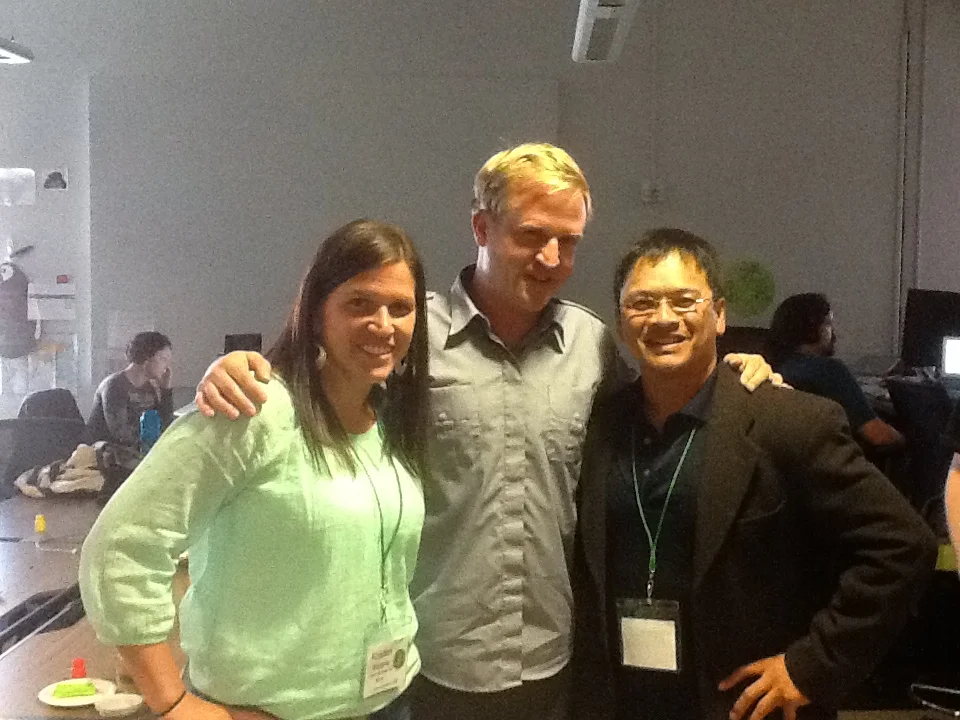As Premal Shah began to say his thanks and praises for a wonderful weekend event at Kiva U Summit, he asked us each to close our eyes and think of the someone/something that likely had inspired us, that led us in some way or another here today. Closing our eyes allowed us take the focus off of us, and place the focus on something greater.
I closed my eyes and began to reflect. It was hard not to think about the present, the wonderful people I had met and that had inspired me over the past few days. But, who had inspired me to be here? The question felt daunting. So many people have supported me over the course of the last few years as I led my classes through micro lending and poverty projects. So many people had encouraged me in my pursuit of bringing my classroom global. How could I possibly reflect in one minute on all of these people?
As I continued to keep my eyes closed though, I began to relax into the space and before I knew it thoughts of my family and Andrew came pouring in. Being brought up in a household with a brother with special needs, we were brought up with the understanding that “Fair wasn’t always equal and equal wasn’t always fair”.
This lesson wasn’t always easy. I recall writing my college essay about the moments when my brother would receive stickers for getting a good daily report from elementary school and wondering why I didn’t get daily treats for doing the right thing. And as I grew up it became all too clear why this motto needed to be a part of our household. It wasn’t fair to give Andrew the same rules as me, the same privileges, or the same expectations to be met.
We were brought up to be fair people, thanks to some wonderful parents supportive teachers and leaders along the way. We were brought up to be empathetic, compassionate, and helpful to our little brother and to others we came in contact with as well.
Although I have tried to find ways to compare this motto from my childhood to the issue of global poverty, I am struggling. We know the world isn’t not going to provide full equality of resources and finances anytime soon, however wouldn’t it be nice if it was at least fair? Wouldn’t it be nice if being born in a certain country allotted us the same choices to attain basic human rights? Wouldn’t it be nice if even in this country a person with special needs could be provided more support to live above the poverty line? Personal, yes.
Days after saying goodbye to my new friends and professional learning network committed to making a change in this world through teaching with Kiva and micro finance, I reflect back on the comment made by Jake of Nuru “don’t let this just be another conference”. I can say without a doubt that it wasn’t. I walked into my classroom, my Kiva Council Club and back into my life with many new ideas and a stronger commitment to educate the youth of my school to work towards ending poverty one Kiva loan at a time at the moment. Hopeful that they too become empathetic, compassionate and a whole lot more.
What else did I bring home from Kiva U Summit? What are the goals I hope to accomplish? Here are a few...
1. Engage my Kiva Council in meaningful work including a stronger field partner connection/plan, learning more about local kiva zip businesses, and sub groups to work on 2013 driving questions. Create leadership opportunities within the group. Currently open to the idea of borrowing against our Kiva “portfolio” to create a larger product to sell at an event and increase our overall lending capabilities.
2. Create meaningful connections from the material (6th grade math) to the concepts we work through while running our businesses. For example, business plans will include algebraic equation to show costs, input/output tables and graphs to show breakeven points. Document the growth of their math skills alongside 21st century skill growth.
3. Continue to connect with likeminded educators through Kiva U k-8 educators page and Kiva U facebook page and reach out to Sacred Heart Prep about local connections. Also continue to reinforce the desire of the Kiva Council to loan to schools that are trying to build their program, an approach that empowers the boys and allows others to discover what global education can do not only for their students but also for themselves as educators.
It’s time to press send on this blog post. What occurred in those 3 days at the summit will certainly stay with me for a long time and continue to influence my classroom. But sometimes you just have to say, “the end” to a post lingering in the “save draft” column. Sometimes it's hard to say goodbye too.



